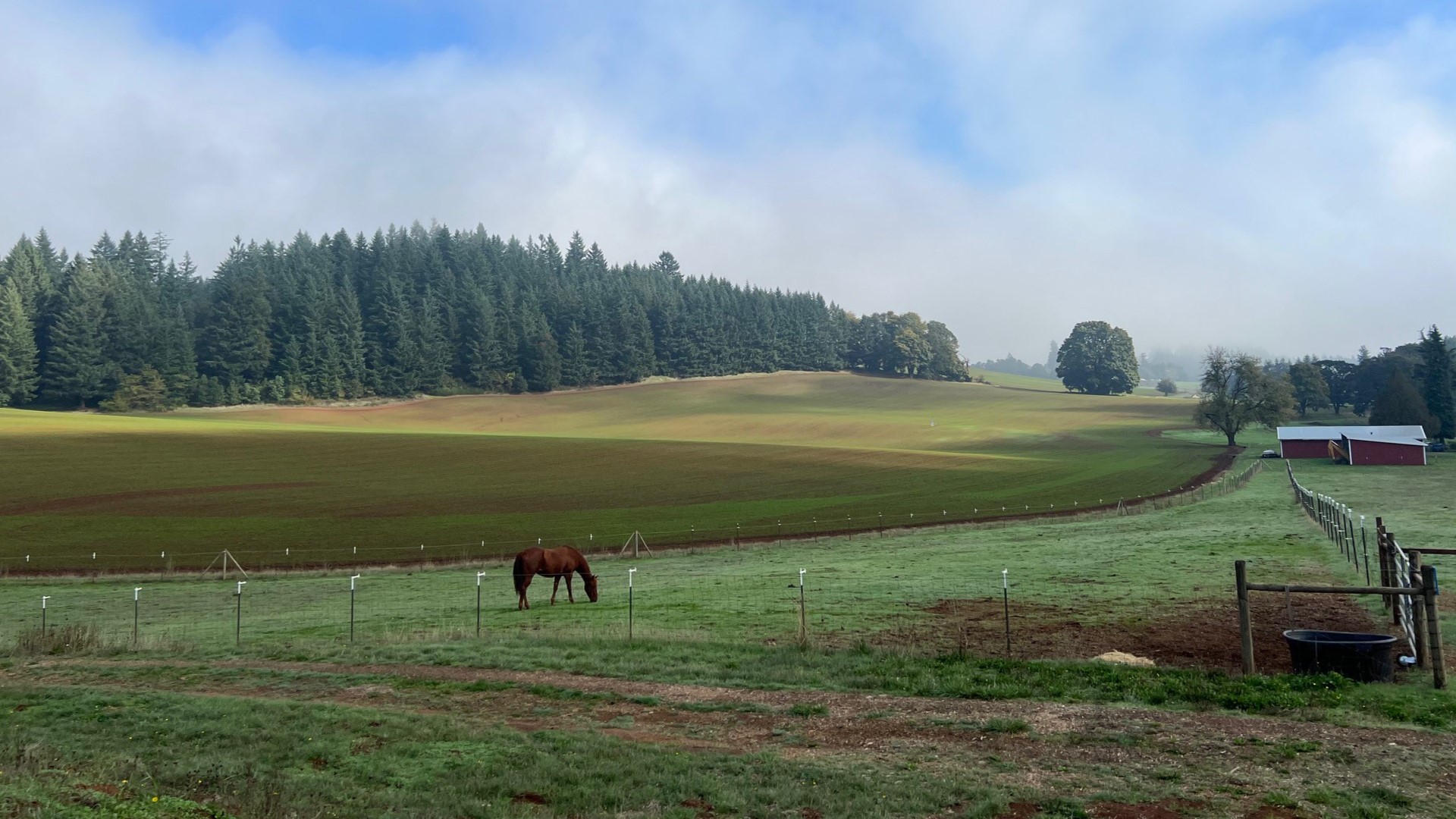TURNER, Ore. — Monica Dodge knows what it feels like to lose hope.
“I was lost,” she said. “I went inward. I wasn’t connecting with anyone.”
It was a dark time in Dodge’s life. In 2008, she was working for Child Protective Services when a perpetrator of domestic violence, she said, pinned her against a car.
Dodge’s trauma from the experience turned to anxiety, depression and eventually post-traumatic stress disorder.
Eight years later, when Dodge was working in the court system and was assigned to a restraining order, the feelings came flooding back.
“The perpetrator … kept calling and threatening the victim,” Dodge said. “And I felt all of it come rushing back. That sense of, 'You’re not safe, that you’re going to get hurt.'”
Dodge started having panic attacks. She couldn’t work. She became suicidal. Counseling was helpful, she said, but it wasn’t enough.
Her husband, Jason, is a Gulf War veteran who suffered through his own trauma and recovery. He had found healing by making a connection with horses, and he threw her a lifeline.
“I remember kind of being able to take a breath,” Dodge recalled.
It was her first time face-to-face with a Palomino Quarter Horse named Skip.

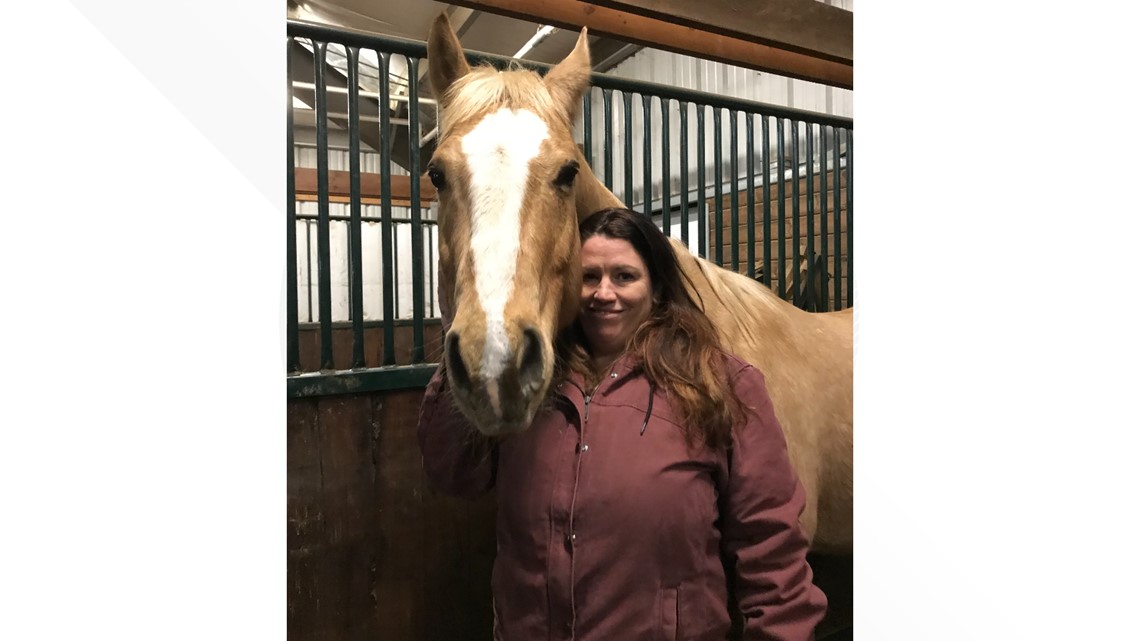
“(It) was really powerful,” she remembered. “To have the horse look at you, really look at you, when you’re disassociating. To be seen, is what it felt like.”
Seen. Through the eyes of a horse, she said. For her pain. Her suffering. For everything.
“It changed my life,” Dodge said. “Completely.”
Mirroring human emotions without judgment
Some seven years later, Dodge is executive director of Horses of Hope, the very place she credits with saving her life. It’s a nonprofit that pairs people of all ages and abilities, including veterans, with horses.
More than 100 participants each week, some with physical or developmental disabilities, climb on horseback in the indoor arena, or along the outdoor trails that meander over rolling hills and through groves of trees, for a half-hour ride.
“I live and breathe this place because of the impact it makes,” Dodge said.
It's because she knows first-hand how these amazing animals are capable of helping and healing so many.
“I became one with (Skip),” Dodge remembered. “If I let my breath go, he would let his breath go. So, we were completely connected with each other.”
That connection is possible, in part, Dodge explained, because horses are highly intelligent animals that mirror human emotions. As prey animals that live in herds in the wild, Dodge said, they naturally conserve their energy.
If you’re feeling anxious, even if you don’t realize it, Dodge explained, chances are they’ll let you know by moving away.
“So, if you have positive, calm energy, (horses) will stay in your presence,” Dodge said. “They require you to learn to be calm, to kind of look inward to what you’re feeling.”

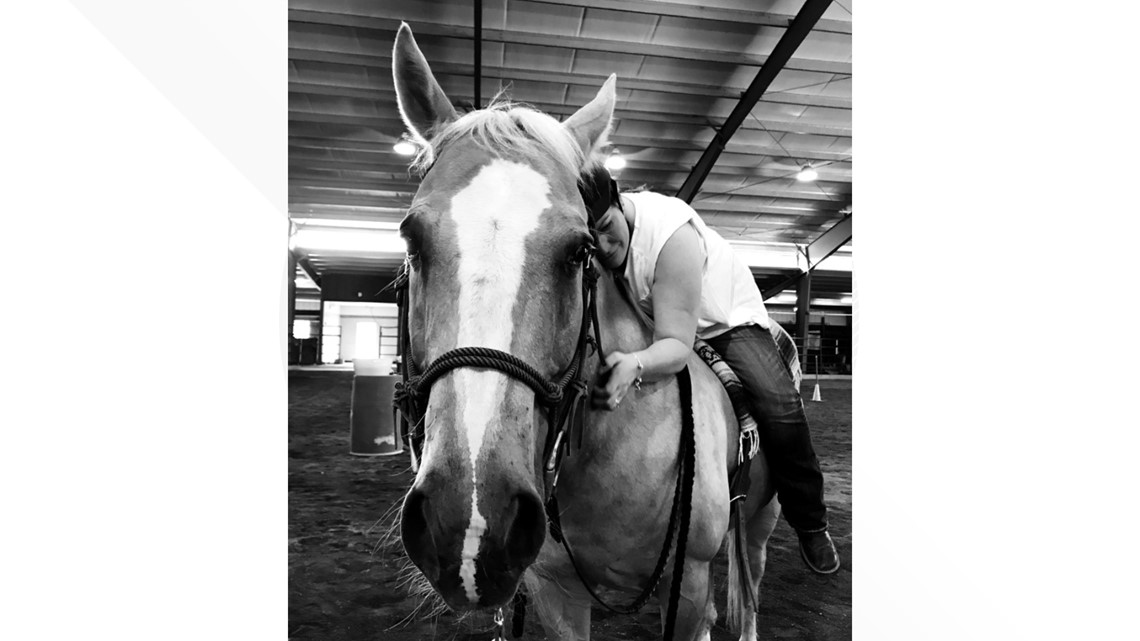
That introspection, and the connection she developed with Skip as she learned to ride, Dodge said, helped her begin to process her trauma, and to move forward.
“I had all these little successes,” she remembered. “It gave me a sense of control that I didn’t have before.”
And Dodge took it one step further: going back to school to get her master’s in interdisciplinary studies, with a focus on psychology and equine science.
And while the research around what’s broadly known as equine-assisted therapy is still evolving, there is evidence, Dodge said, that the creatures she calls "majestic" can impact human breathing, even calm heart rates.
The impacts range from boosting a rider’s confidence, she said, to learning to care for another being other than yourself — even using muscles in a brand new way.
“We had a participant who, when they started, couldn’t walk,” Dodge remembers. “And through the developments of (muscles) during our riding, after 6 weeks (was) able to walk.”
Freedom on the back of a horse
Sarah Law knows she will likely never walk on her own. But on the back of Brewen, a muscly 14-year-old Norwegian Fjord with a spiky black and blonde mane, she feels free.
“It’s empowering,” Law said.
Law was born with a condition called arthrogryposis multiplex congenita distal type 2E. It has impacted her joints and muscle development since birth. And while she is wheelchair bound, that doesn’t stop her from riding horses; something she’s been doing at Horses of Hope nearly every week for the last five years.
And Brewen, who she calls “spunky” because he doesn’t always like to listen, happens to be her favorite.
“He always tries to give me kisses,” Law said. “And sometimes he’s tried to drive my wheelchair!”
Getting on Brewen is one of the handful of times Law is able to leave her wheelchair behind. With the help of staff and volunteers, she is lifted by a contraption that looks like a human-sized version of an arcade crane claw, which supports her legs and back as she’s lifted onto Brewen.

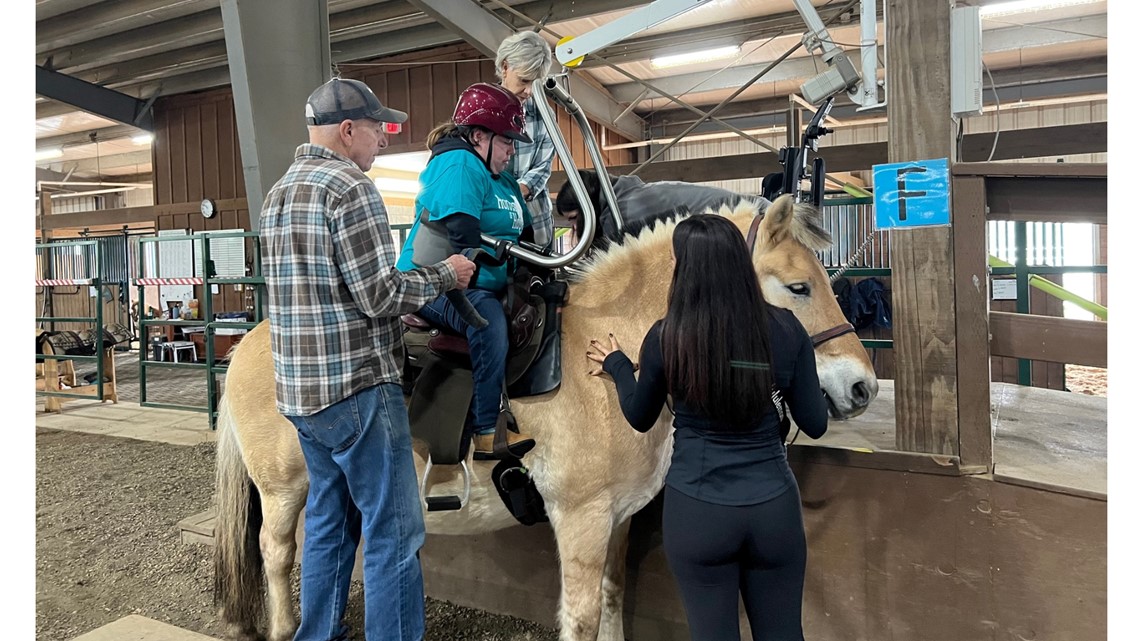
From there, Law takes the reins and sets off.
Instructor Kendall Nickerson holds a lead line out front and a volunteer walks on each side to make sure she’s safe.
As it turns out, riding a horse is an exercise for both the mind and the body.
As Nickerson calls out instructions, Law weaves Brewen in and out of a circle of cones. They go over, around, and stop at what are called cavalettis, poles for jumping that have been placed flat on the ground.
They pick up the pace with an extended walk from one barrel to another, and in a moment of sheer delight, Law expertly pilots Brewen to bump a giant green inflatable exercise ball around the indoor arena with his nose.
“I’m not really thinking,” Law said. “I’m just enjoying the moment.”

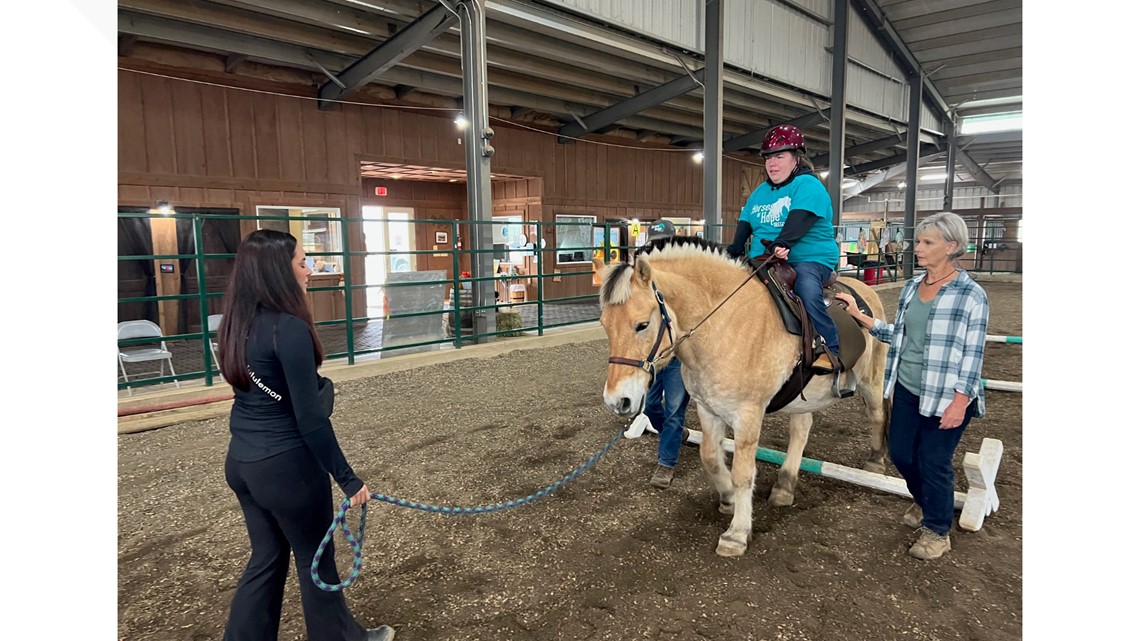
Riding, Law said, has helped her build muscle and improve balance. And it means she’s not just sitting at home or working.
“It’s just my time,” Law explained. “And it’s something I look forward to every week.”
Nickerson, who’s been working with Law for the past six months or so, said she has progressed by leaps and bounds and is almost ready to ride independently.
“I just have a nice loose lead rope,” Nickerson said, “and I kind of let her do it all.”
“How do you think horses change people?” KGW's David Molko asked her.
“I think horses can just read people so well, and I think they can just understand … what someone needs,” Nickerson answered.
A call to the community
But meeting those needs is getting increasingly difficult, Dodge said, because of the current economic climate — with inflation, fewer grants, and generally people donating less.
“Hay prices went up. The feed in general for the horses went up. Veterinary care. Everything’s gone up,” Dodge said.
She’s worried that falling revenue could soon impact how many sessions they can offer with their 14 horses, given that Horses of Hope subsidizes every ride, she said, and provides full scholarships for 20% of their participants — never mind the waitlist that’s now some 70 people long and growing.
“We definitely need the generosity of our community to help us stay afloat,” Dodge said.
Options include donating cash to support operating costs, monthly gifts that directly fund participants’ rides, or sponsoring a horse.

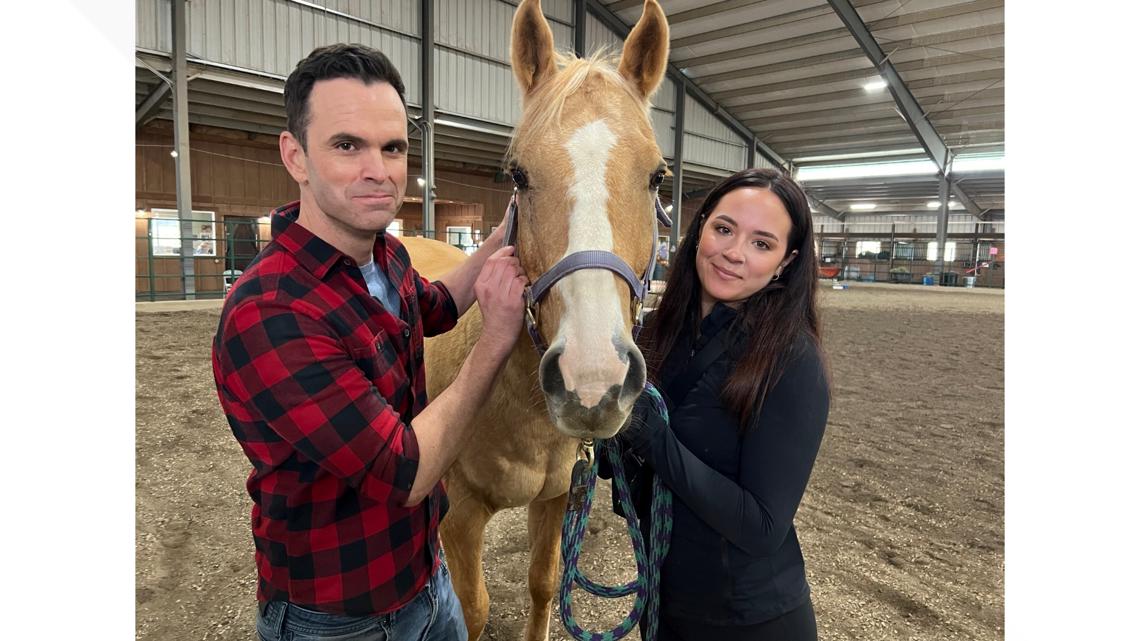
Plus, Horses of Hope is always in need of volunteers to muck out stalls, clean the barn and get horses ready to ride.
“This is my heart,” Dodge said.
And as we wander the trails with a 17-year-old miniature horse named Gloria, whose head barely comes up to Dodge’s knee, she reminds us of what she believes is at stake, and what the horses in this place she credits with saving her life make possible for so many.
“There’s a lot to be said of just feeling free and alive,” Dodge said. “It’s magic.”

